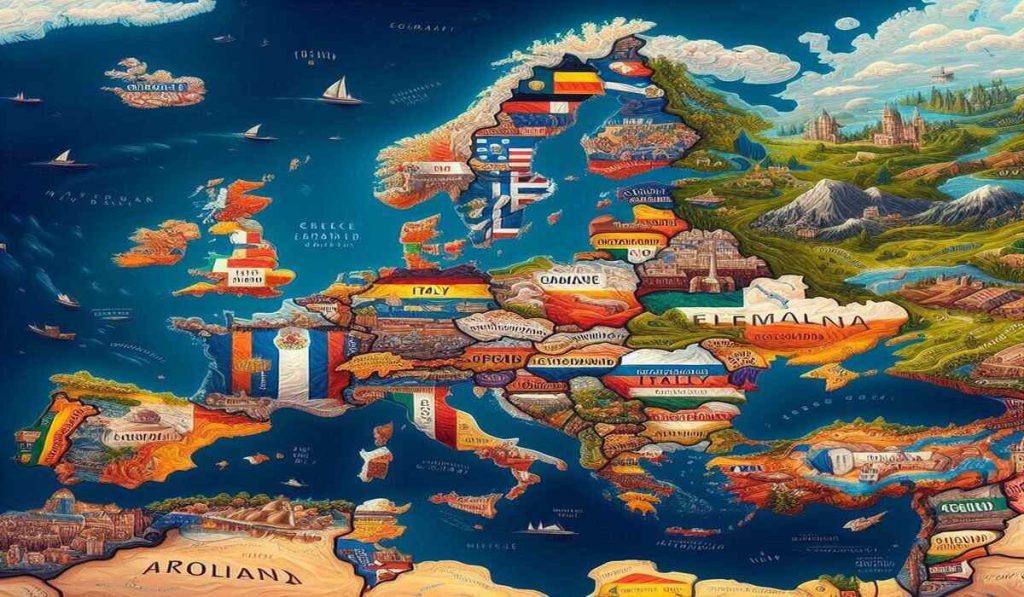Europe is a continent rich in history, culture, and centuries-old traditions—many of which are deeply rooted in superstition. From the mysterious fairies of Ireland to the evil eye of Greece, these beliefs continue to shape the lives and customs of various countries.
Whether it’s avoiding unlucky days, carrying good luck charms, or observing rituals to ward off misfortune, superstitions offer a unique glimpse into the cultural fabric of these nations. In this post, we’ll explore the top 10 most superstitious countries in Europe, each with its own fascinating set of beliefs that have stood the test of time.
10 Top Superstitious Countries Across Europe
1. Ireland: Folklore and Fairies
Ireland’s folklore is rich with tales of fairies, leprechauns, and banshees. These mythical creatures influence many aspects of Irish culture, with some people still avoiding fairy forts or rings out of respect for tradition. While some may dismiss these as mere stories, they continue to shape customs and practices in Ireland, offering insight into a cultural heritage that has been passed down through generations.
One peculiar Irish superstition involves finding a halfpenny coin:
If you find a halfpenny, you’ll have good luck.
This belief stems from the rarity of halfpenny coins, which were discontinued in January 1987. The scarcity of these coins makes finding one a fortuitous event, symbolizing good fortune for the finder.

2. Greece: The Evil Eye’s Watch
The belief in the evil eye, known as “mati,” is widespread in Greek culture. This concept holds that a malicious gaze can bring misfortune to its recipient. To counter this, Greeks often use protective amulets called “mati,” typically blue and white eye-shaped designs. These amulets are displayed in homes, businesses, and worn as jewelry. While some may view such superstitions as outdated, they remain integral to contemporary Greek life, offering both spiritual protection and a connection to ancient traditions.
Another peculiar Greek superstition involves simultaneous speech:
When two people say the same word at the same time, they must quickly say “Please Kokkino” (meaning “touch red”) and touch something red. Failure to do so is believed to result in an inevitable fight between the two individuals.
3. Italy: Numbers and Omens
Italy’s relationship with numbers and omens showcases a blend of cultural beliefs and historical lore. Unlike the common fear of 13, Italians view it as a symbol of prosperity. However, the number 17 is considered ominous, largely due to its Roman numeral representation, XVII, which can be rearranged to form VIXI, meaning “I have lived” in Latin.
This aversion to 17 affects various aspects of Italian society:
- Buildings often skip the 17th floor
- Hotels may not have a room numbered 17
- Some planes lack row 17
Italian attention to omens extends beyond numbers, with everyday occurrences often interpreted through superstition. These beliefs guide behaviors and decisions in personal and professional settings, demonstrating the enduring power of symbols in shaping Italian life.
4. Romania: Folklore’s Shadows
Romania is known for its rich folklore, particularly tales of vampires and werewolves. In rural areas, these legends continue to shape communities. Vampires, or “strigoi” and “moroi” in Romanian folklore, are often described as restless spirits of the dead. Unlike Western depictions, Romanian folklore treats vampires with caution, viewing them as potential harbingers of misfortune.
Werewolves, or “vârcolaci,” are thought to be humans cursed to transform at full moon. These tales often serve to explain natural phenomena. Romanian superstitions also include omens and protective charms, with rural communities commonly using amulets and talismans to guard against evil spirits.
An interesting Romanian superstition involves crows:
| Number of Crows | Omen |
|---|---|
| 1 | Bad omen |
| 2 | Luck |
| 3 | Health |
| 4 | Wealth |
| 5 | Illness |
| 6 | Death |
As Romania adapts to modernity, folklore remains vital to its national identity, preserving a connection to the country’s heritage.
ALSO SEE: Gypsy Traditions and Superstitions
5. Spain: Fear of Tuesday the 13th
In Spain, Tuesday the 13th is considered an unlucky day, rather than Friday the 13th. This belief stems from the association of Tuesday, or “Martes” in Spanish, with Mars, the Roman god of war. The superstition is strengthened by historical context, such as the belief that the confusion of languages at the Tower of Babel occurred on a Tuesday the 13th.
This superstition affects various societal behaviors:
- Many Spaniards avoid starting important ventures on this day
- Some postpone travel plans, weddings, or crucial meetings
- Decision-making is often delayed until the inauspicious date passes
While some might view this apprehension as curious, for many Spaniards, it’s an integral part of their cultural identity, illustrating how deeply rooted traditions continue to influence modern life.
6. Switzerland: The Luck of Language
In Switzerland, wishing someone “good luck” is believed to bring misfortune. Instead, Swiss individuals use the word “merde,” meaning “shit” in French, to express goodwill. This alternative expression is thought to ward off bad luck by invoking the unexpected.
This linguistic quirk exemplifies how the Swiss blend humor and superstition into their cultural practices. By choosing words that defy expectations, they reflect a worldview valuing subtlety and ingenuity. The use of “merde” also highlights a playful defiance of linguistic convention, showing an understanding of words’ power beyond their literal meanings.
This practice demonstrates how deeply superstitions are woven into the social fabric of Switzerland, guiding behavior with a mix of caution and creativity.
7. Poland: The Power of the Chimney-Sweep
In Poland, encountering a chimney sweep is believed to bring good fortune. The custom of grabbing a button upon seeing a chimney sweep illustrates how Poles believe tangible actions can influence one’s luck. This tradition originated when chimney sweeps were considered harbingers of good fortune due to their association with home well-being and prosperity.
The practice works as follows:
- Spot a chimney-sweep
- Quickly grasp a button on your clothing
- Hold it firmly to capture good fortune
This gesture is believed to ensure the continuance of good luck. It underscores the belief that luck is actively pursued rather than passively awaited.
In a changing world, these practices persist as echoes of a shared past. The chimney-sweep’s symbolic power extends to both rural and urban settings, highlighting an enduring cultural cohesion that transcends socioeconomic boundaries. By embracing this tradition, Poles integrate superstition into modern life, keeping alive a custom that offers both security and a nod to heritage.
8. Germany: Wedding Plate Smashing
In Germany, a unique pre-wedding celebration called “Polterabend” involves smashing porcelain plates. This traditional ritual is believed to:
- Dispel negative energies
- Clear a path for the couple’s future
- Ward off evil spirits and misfortune
Friends and family gather to participate in this cathartic act of breaking crockery, symbolizing the release of worries. The custom highlights the communal nature of German society, where social support plays a crucial role in personal happiness.
After the plate-breaking frenzy, the couple sweeps up the debris together. This first cooperative task represents their future partnership and shared resolve in facing life’s challenges.
The Polterabend tradition exemplifies how a seemingly simple activity can carry profound cultural significance, demonstrating Germans’ commitment to upholding and celebrating their heritage.
9. France: Bread’s Bad Luck
In France, placing a baguette or any loaf of bread upside-down on a table is considered extremely unlucky. This superstition has medieval roots, when bakers would flip bread reserved for executioners to mark it as off-limits.
“If you were to leave your baguette upside down, you’re inviting famine into your home.”
Although baguettes didn’t exist in medieval times, the symbolic act of flipping bread became associated with misfortune. Today, while the historical context has faded, the superstition persists, reflecting the importance of bread in French culture, where it symbolizes:
- Hospitality
- Prosperity
- Blessing
This custom highlights how historical practices can influence modern behavior, showcasing the power of symbols in shaping collective cultural norms.

10. Denmark: Birds and Fortune
In Denmark, there’s a peculiar belief that being defecated on by a bird is a sign of good luck. This superstition transforms an inconvenient event into a positive omen, reflecting the Danish tendency to find optimism in unexpected situations.
While the origins of this belief are unclear, its persistence underscores a cultural acceptance of life’s unpredictability. The lighthearted approach to this superstition aligns with the Danish ethos of adaptability and finding humor in life’s quirks.
In daily life, this belief adds a touch of whimsy to Danish culture, encouraging people to maintain a cheerful disposition even in minor inconveniences. It exemplifies a cultural resilience where optimism and acceptance of nature’s whims coexist.
This unique superstition serves as a reminder that fortune can come in unconventional forms, and one’s perspective can transform potential misfortune into an amusing experience.
In the context of cultural beliefs, superstitions serve as a connection between past and present, offering insight into how communities preserve their heritage. These traditions reveal the enduring power of symbols in shaping everyday life. By understanding these practices, we gain a deeper appreciation for the ways in which history and belief continue to influence modern societies.
